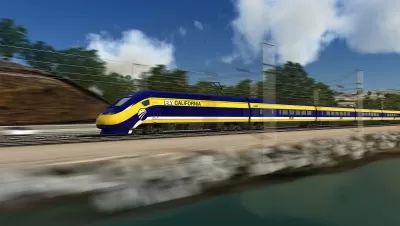Despite numerous legal and legislative setbacks in the last few months, the California High Speed Rail Authority has released a new business plan—the first update of the controversial plan since 2012.

Last week, the California High-Speed Rail Authority issued the 101-page draft of its 2014 Business Plan. The plan will be available for public comment for two months before a final version is submitted to the California State Legislature on May 1.
According to a report by Tim Sheehan, the new business plan “estimates the construction cost for Phase 1 of the statewide project from San Francisco to Los Angeles at about $67.6 billion.”
The new cost marks a slight decrease from the most recent, prior estimates: “The new forecast is down slightly from $68.4 billion estimated in 2012, but still more than double the $33 billion predicted in 2008 when California voters approved Proposition 1A, a $9.9 billion bond measure to help finance high-speed rail planning and construction.”
Added to what appears to be forward motion for the project, Tom Zoellner also recently penned an op-ed asking California not to give up on the idea—with some stipulations.
FULL STORY: Public gets first crack at new high-speed rail business plan

Planetizen Federal Action Tracker
A weekly monitor of how Trump’s orders and actions are impacting planners and planning in America.

Maui's Vacation Rental Debate Turns Ugly
Verbal attacks, misinformation campaigns and fistfights plague a high-stakes debate to convert thousands of vacation rentals into long-term housing.

Restaurant Patios Were a Pandemic Win — Why Were They so Hard to Keep?
Social distancing requirements and changes in travel patterns prompted cities to pilot new uses for street and sidewalk space. Then it got complicated.

In California Battle of Housing vs. Environment, Housing Just Won
A new state law significantly limits the power of CEQA, an environmental review law that served as a powerful tool for blocking new development.

Boulder Eliminates Parking Minimums Citywide
Officials estimate the cost of building a single underground parking space at up to $100,000.

Orange County, Florida Adopts Largest US “Sprawl Repair” Code
The ‘Orange Code’ seeks to rectify decades of sprawl-inducing, car-oriented development.
Urban Design for Planners 1: Software Tools
This six-course series explores essential urban design concepts using open source software and equips planners with the tools they need to participate fully in the urban design process.
Planning for Universal Design
Learn the tools for implementing Universal Design in planning regulations.
Heyer Gruel & Associates PA
JM Goldson LLC
Custer County Colorado
City of Camden Redevelopment Agency
City of Astoria
Transportation Research & Education Center (TREC) at Portland State University
Jefferson Parish Government
Camden Redevelopment Agency
City of Claremont



























